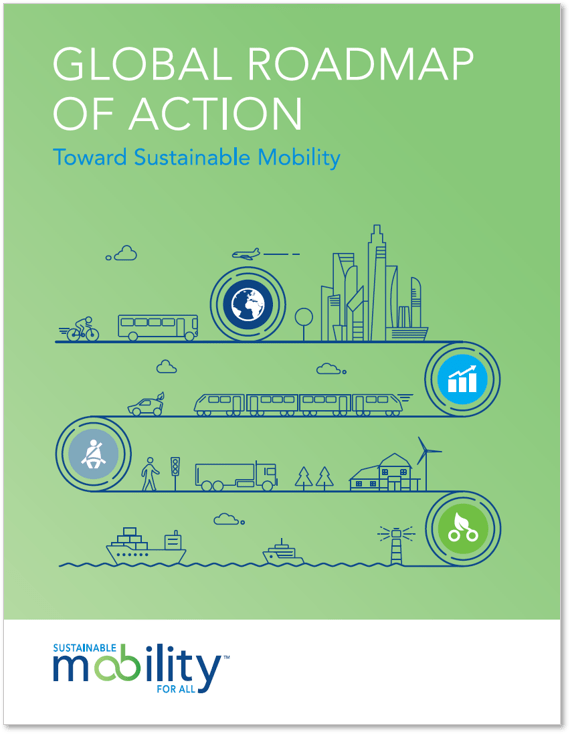Challenge
The Global Mobility Report 2017 (GMR) benchmarked countries’ performances on mobility relative to the four policy goals of sustainable mobility: universal access, efficiency, safety and green. The findings of that report were alarming, some countries are closer than others in achieving one or more policy goals, but not a single country in the world (including both developing and developed country) is on target. For example, based on Global Tracking Framework, South Africa sustainable mobility index is 40.3 meaning that South Africa is 40 percent away from the end goal of sustainable mobility. This established an imperative for action on mobility around the world on “How countries can achieve the sustainable mobility?”. The Global Roadmap of Action Toward Sustainable Mobility (GRA) tackles head-on to this question faced by many decision-makers in transport without focusing on one policy goal at the time e.g. safety or access. It is unique in the following two ways:
- It proposes a coherent and integrated menu of policy measures to attain the SDGs and achieve the four policy goals that define sustainable mobility (i.e., universal access, efficiency, safety and green mobility).
- It defines a path for countries to follow to attain the SDGs and achieve the four policy goals that define sustainable mobility. This path consists of a series of action plans to be implemented over time depending on progress on mobility and the objectives of the countries themselves.
Approach
In supporting the World Bank goals of ending extreme poverty and promoting shared prosperity, the Sustainable Mobility for All initiative (SuM4All) is one of the few global partnerships with an initial mandate to provide thought leadership to fill a knowledge gap in the transport sector. SuM4All focuses on a data-driven approach to inform the dialogue with countries on their new mobility strategies and investment programs by using the four-goal framework of SuM4All. This system-wide approach represents a significant departure from the traditional, single-goal-at-a-time, view of transport.
With evidence at hand, SuM4All embarked on a major drive in 2018 to develop a comprehensive policy framework to assist decision makers in cities and countries as well as practitioners at development banks to identify gaps, necessary steps, and appropriate instruments to improve the sustainability of their transport sector, attain their country priorities and the SDGs. Including all modes of transport and sustainable mobility framework, the GRA comprises a catalogue of more than 180 policy measures and an algorithm to generate “country action plans” toward sustainable mobility. The report builds on six policy papers and one private sector consultation summary paper, the content of which are made accessible and usable in a web-based tool for prioritization action and decision-making.
The GRA was developed through an iterative process to ensure its relevance and practicality. It involved the 55 member organizations making their knowledge available to the platform. Policy makers at the country and city levels engaged on various drafts and to share their experience, and more than 25 large corporations contributed views on constraints in the enabling environment to ensure sustainability in transport.
Results
Launched by SuM4All in October 2019, the GRA boosted technical credibility and legitimacy for broader transport sector development interventions by developing tools to assess and help guide the journey of countries toward sustainable development goals and sustainable mobility.
- The GRA is a tool that enables any country in the world to: (i) measure how far it is from achieving that ambition, (ii) explore more than 180 policy measures that have been tested around the world, and (iii) prioritize those that are most impactful and lay out a path forward.
- The GRA Report is complemented by six policy papers, a private consultation summary paper, and an online, interactive tool. The policy papers cover universal rural access, universal urban access, gender, efficiency, safety, green mobility.
- The “Decision-Making Tool for Mobility” is a web-based tool that makes the policy framework easily available and usable for policy making and dedicated to decision makers and practitioners in the field. This tool enables its users to derive and customize a series of action plans tailored to their country’s performances on mobility. It enables better policy decisions on sustainable mobility in countries around the world, based on (i) Mobility performance data; (ii) Up to date most effective policy measures; (iii) An algorithm to prioritize actions.
- In 2020,the Global Tracking Framework for Transport (GTF) to the GRA online tool was added to enable to both diagnosing issues (based on data) and recommending policy action given country context. The GTF was expanded to include new indicators, updated data and time series for all indicators. With that, the international transport community is equipped with a structured framework to track country-level progress toward sustainable mobility.
- A new Global Sustainable Mobility (SM) Index was developed in 2020 to rank countries on sustainable mobility. This index and ranking are expected to help driving a new dialogue with clients on transport and mobility.

